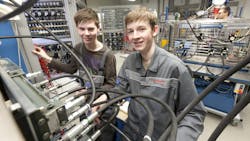Mike Bryan has been an apprentice instructor at Bosch and then its subsidiary, Bosch Rexroth, for a long time -- 35 years, during which time he's trained 700 apprentices. Even before that, he graduated from the Bosch apprentice program himself, at the Charleston, S.C., plant. But he's quick to qualify that, thank god, he didn't graduate from the company's first apprenticeship class.
That was in 1886, when the company was founded and the entire workforce consisted of one engineer and one apprentice. So to say that apprenticeships are part of the Bosch culture is kind of the understatement of the century.
Bryan now trains machining (a four-year program) and mechatronics (two years) apprentices at Bosch Rexroth's Fountain Inn plant in South Carolina. Mark Rolinger is his counterpart in Charlotte, N.C. Their day-to-day jobs are a lot more complex than working with 10 students in a training room. They talk to students from elementary school on. In the evenings, they work on projects with high school students in the FIRST Robotics Competition. They take parents, high school teachers and guidance counselors on plant tours and put together summer camp programs for teachers, too.
The scope of their work highlights the complexity of grooming a whole generation for STEM careers -- that you've really got to meet young people where they're at. Maybe you'll pique their interest in elementary school, or maybe it won't be until they've decided a four-year college isn't for them.
At both plants, initiatives begin at the elementary and middle school level with open houses at the schools, where machine tools and videos are on display and the big kids in FIRST Robotics show off their gadgetry. The outreach effort ramps up in high school. Rolinger estimates he's out at nearby Olympic High School once a week, talking to classes or working with the FIRST team or doing other STEM-related activities.
Partnerships continue at the community college level with Central Piedmont Community College in Charlotte and Greenville and Piedmont Technical College in Fountain Inn. In some cases, instructors from the colleges come to the plant to teach classes; in others, the colleges write the curriculum and Bosch Rexroth employees teach it.
Here are a few of the best practices they shared:
Take the best from other apprenticeship programs and make it your own. Fountain Inn's program is based on a German model of apprenticeship, but it was customized from there. "We said, 'What are we training for? Do we need to have all the things that the German programs have or can we pick a few things out and enhance other things?" says Bryan. "We do a lot more machining in the first year than we did for our German program, and the projects are a lot more complex, and our programs are a little bit shorter."
Turn students into teachers. At Fountain Inn, the new graduates of the adult apprenticeship train the next class of apprentices on the machines, "so they become great instructors as well," says Bryan.
Adopt a school. The Charlotte plant works exclusively with Olympic High School. In addition to sponsoring their FIRST Robotics team, a couple of years ago the plant, through the Bosch Community Fund, gave the school $80,000 to set up a machine shop outfitted with drill presses, lathes, mills and a CNC machining center. That way, students are schooled in the machinery before they graduate and have a head start if they enter the adult apprenticeship program.
Use social media. In Charlotte, recruiting for FIRST Robotics starts with the team's presence on Twitter, Facebook and YouTube. Kids promote the events to their friends, and then more kids get interested in the team.
Bring college students back as co-ops. FIRST Robotics is a feeder for Fountain Inn's engineering co-op program. "It's nice because they've already worked in the apprentice shop on these same machines," says Bryan. "They already know what manufacturing is all about. How clean it is, how high tech it is."
About the Author

Laura Putre
Senior Editor, IndustryWeek
As senior editor, Laura Putre works with IndustryWeek's editorial contributors and reports on leadership and the automotive industry as they relate to manufacturing. She joined IndustryWeek in 2015 as a staff writer covering workforce issues.
Prior to IndustryWeek, Laura reported on the healthcare industry and covered local news. She was the editor of the Chicago Journal and a staff writer for Cleveland Scene. Her national bylines include The Guardian, Slate, Pacific-Standard and The Root.
Laura was a National Press Foundation fellow in 2022.
Got a story idea? Reach out to Laura at [email protected]
